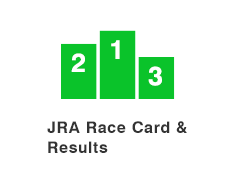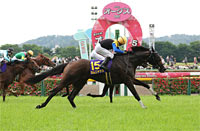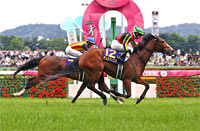2021 News
Yushun Himba (Japanese Oaks) (G1) - PreviewThe big action at Tokyo this week once again spotlights the females. This time, though, it’s the youngsters again, with the second race of the filly triple crown, the Yushun Himba (Japanese Oaks), this Sunday, May 23. The Yushun Himba, otherwise known as the Japanese Oaks, follows the Oka Sho (Japanese 1000 Guineas) in early April and represents a substantial increase in distance, from 1,600 meters to 2,400 meters. Racing shifts from the righthanded Hanshin Racecourse west of Osaka to the spacious Tokyo Racecourse, where races are run to the left. Many of the entrants who have risen through the ranks to the heights as 2-year-olds last year will have participated in the Grade 1 Hanshin Juvenile Fillies, and followed this year with the Grade 1 Oka Sho, both over 1,600 meters, both run to the right. The Japanese Oaks is a different test, not only of speed but also of stamina, and stars that have shone brightly until now may find the spotlight shift. Twenty-one fillies have been nominated the 82nd running of the Japanese Oaks. Eighteen berths are available for a shot at the JPY110 million winner’s share. The hands-down current star of the field is Sodashi. The pure white filly is unbeaten and has already brought home top prize in two Grade 1 events. Here is a look across the standouts of the field. Sodashi: Sodashi’s performance is nothing less of spectacular. She’s a two-time Grade 1 champion at this young age, and unbeaten from five starts. All but her debut was at the graded stakes level as she jumped from her first outing to two Grade 3 events before taking on the 2-year-pinnacle Hanshin Juvenile Fillies. Last out, she captured her second Grade 1 with victory in the Oka Sho. Experience at Tokyo came in her second Grade 3, the Artemis Stakes, but the question this time is whether she can handle the distance. Her winning margins have never been more than a few lengths and in her two G1 wins, she was over the line in first by but a nose, then a neck. It could be her keen sense of competition, but it could be an indication that 2,400 meters, 600 meters longer than she’s ever experienced, may be out of her reach. Adding to the questions is the fact that she’s the daughter of Kurofune, whose progeny have claimed 40 graded stakes races, but all over no more than 1,800 meters. With her win of the Oka Sho, Sodashi became only the third filly to win the race unbeaten. If she can claim the Oaks, she’ll be the 16th to do so with a pristine record, and only the third filly to claim the first two legs of the filly triple crown unbeaten. Akaitorino Musume: The Oaks distance is also a first for Oka Sho fourth-place finisher Akaitorino Musume. She’s only been raced over the mile, from which she has three wins from five starts. All her wins have come at Tokyo and include a first-place in the Grade 3 Daily Hai Queen Cup. Unlike Sodashi, who runs on or close to the pace, Akaitorino Musume likes to settle midfield. Her fourth in the Oka Sho was only 0.2 seconds slower than Sodashi’s winning time. Also, Akaitorino Musume has a confidence-boosting pedigree. Sired by Triple Crown champion Deep Impact, and light on her feet as he was, the blue-blooded Akaitorino Musume also has good prospects from her dam, five-time G1 champion Apapane, who landed the Japanese Oaks (and the filly triple crown) in 2010. Apapane was also trained by the Miho-based Sakae Kunieda. Jockey Christophe Lemaire is expected to have the ride and it will be his first time to partner the filly. Uberleben: A length and a nose behind Cool Cat in the 2,000-meter Grade 2 Sankei Sports Sho Flora Stakes (her most recent race), just a bit further off the top in the Grade 3 Flower Cup and only 0.1 seconds behind Sodashi in the Hanshin Juvenile Fillies, Uberleben has always been in the picture, just not in the winner’s circle. In fact, she failed to make the Top 3 only once in her six starts thus far, in the Grade 3 Artemis Stakes over the Tokyo mile. With her far-off-the-pace running style, it’s ground she’s been wanting, the more the better, just like her sire, the six-G1 champion stayer Gold Ship. Jockey Mirco Demuro, who rode two of her last three starts, is expected in the saddle. Fine Rouge: A filly by Kizuna, Fine Rouge has only four starts behind her, but has figured in the money in all and won two of them. Started over a 1,200-meter sprint, she broke her maiden next out with a furlong more, then aced the Grade 3 Fairy Stakes over the mile. Last out was the Oka Sho, where she crossed the line in third place only 0.1 seconds behind Sodashi. Based at Miho, she’s already well traveled, starting at a different venue each time she raced. Tokyo is where she notched her first win, but 2,400 meters is a huge leap up. She has shown versatility and good racing sense and owns a mean final kick. Though her dam was a winning sprinter, her Derby-winning sire, and Jockey Yuichi Fukunaga in the saddle gunning for his fourth Oaks victory, should help her to stay the distance. Stellaria: Another Kizuna filly who has impressed and one that is taking on her first Grade 1, is Stellaria. She hasn’t reached the heights of several of the other competitors, but she has finished in the top three in all but one of her six starts and has recorded the field’s top speed over the final three furlongs in all but one as well. She’s been consistent over a range of distances from 1,400 to 2,000 meters and has proven well-suited to the Tokyo course, where she picked up a second in the Begonia Sho and, following a slow break, a sixth-place finish 0.3 seconds behind the winner in the Grade 3 Queen Cup, both over the mile. She is primed with a 1:58.0 win of the Wasurenagusa Sho over the Hanshin 2,000 meters. In the last 10 runnings of the Oaks, three fillies (including Loves Only You in 2019) coming off a win of the Wasurenagusa Sho, went on to win the Oaks. Although Yuichi Fukunaga rode her last four races, this time Stellaria is to be partnered with jockey Yuga Kawada for the first time. Kawada, who has 10 graded wins so far this year, last won the Oaks in 2012, when he joined up with Gentildonna for the first time. Kukuna: Her sixth in the Oka Sho was the only time this daughter of King Kamehameha missed the board. Kukuna has done well in two Grade 3 races at Tokyo, a second to Sodashi in the Artemis Stakes, and a close third in the Queen Cup. Though Kukuna has only been raced over 1,500-1,600 meters, she is out of the Deep Impact mare Culminar, who, in 2015, was second in the Oka Sho and third in the Oaks only 0.2 seconds off the winner. The extra distance should be welcome and young jockey Takeshi Yokoyama, who made his debut as a jockey only four years ago but already No. 7 in the JRA Jockeys Rankings, is slated for the ride. Others to keep an eye on are: Cool Cat, a big Screen Hero filly weighing in at 506 kg last out, captured the Grade 2 Flora Stakes. Following her winning debut, she has done better each time she’s gotten more ground and looks to welcome the extra two furlongs. Her ability to race from a number of positions and her suitability to Tokyo should work in her favor. The Orfevre-sired Slyly returned after two and a half months, looked much improved and finished second in the Flora Stakes. Further improvement is expected. Tagano Passion, by King Kamehameha, is 3-1-1 over starts in the 1,800-2,000 meters range and coming off a win of the Sweetpea Stakes over the Tokyo 1,800 meters. Art de Vivre, also with only three starts, all over the mile, finished fifth in the Oka Sho and is 1-2 at Tokyo. With the trip from Ritto, her condition on raceday will be key. |

|


























